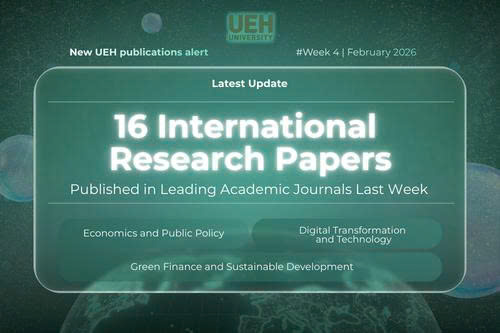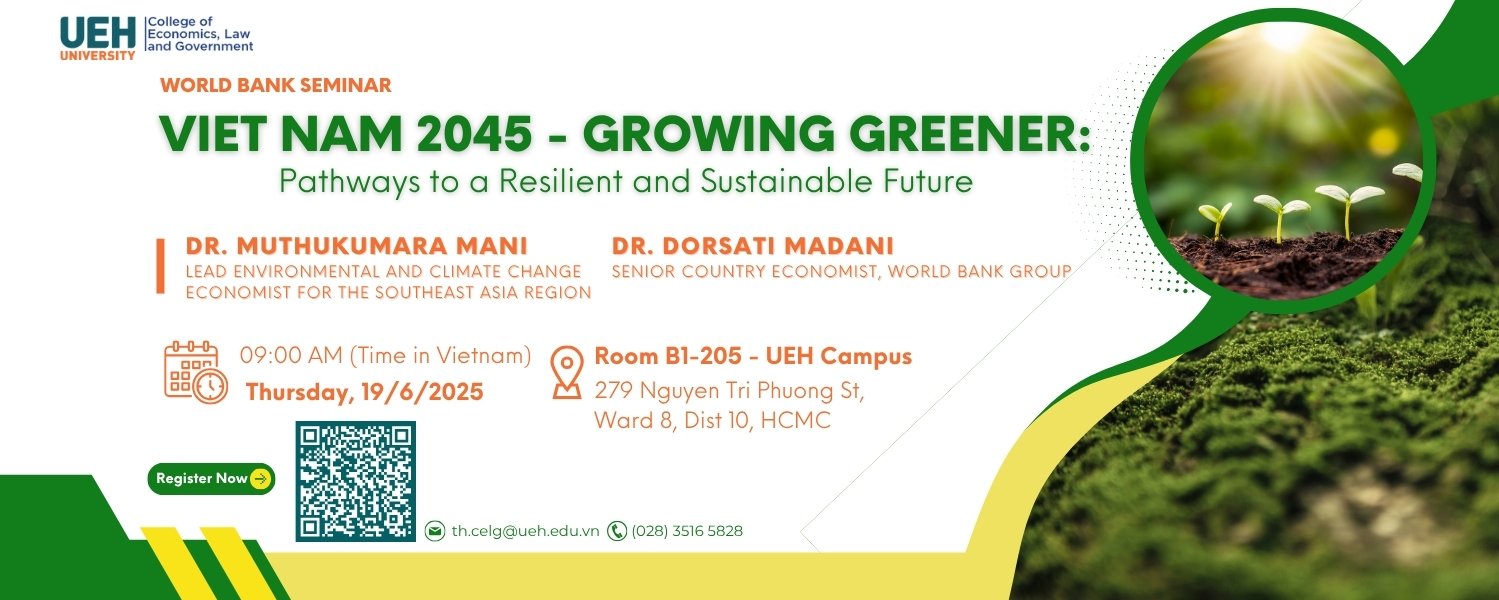
- 19 Jun
- 2025
Seminar jointly organized by the World Bank and the College of Economics, Law and Government UEH
The College of Economics, Law and Government would like to respectfully invite lecturers/ researchers to come and share your experiences at the seminar on "Vietnam's Pathways to a Resilient and Sustainable Future" featuring insights from the World Bank's latest analysis on Vietnam's green growth ambitions and climate resilience strategies.
This seminar will explore Vietnam's bold vision to become a high-income economy by 2045 while achieving net-zero emissions by 2050. We will examine the critical intersection of economic development, climate adaptation, and sustainable growth. Key topics to be discussed are Climate adaptation & resilience, Green growth & decarbonization, and Sustainable marine economy. The seminar will also present evidence-based policy recommendations for 2026-2030 utilizing the World Bank MANAGE Model.
- Date: Thursday, 19 June 2025
- Time: 9:00 - 11:00
- Venue: Room B1-205, UEH Campus 279 Nguyen Tri Phuong, District 10, Ho Chi Minh city.
- Featured speakers: Dorsati Madani (Senior Country Economist) and Mani Muthukumara (Lead Environmental and Climate Change Economist for the Southeast Asia Region), the World Bank
The seminar will include interactive discussions and Q&A sessions, providing opportunities for networking and knowledge exchange among participants from diverse backgrounds. We look forward to your participation in what promises to be an engaging and informative session to see how these powerful analytical tools translate into actionable policy insights
To register to attend the seminar, please fill out this form: https://go.ueh.edu.vn/worldbankseminar2025
Abstract:
In responding to these critical questions, this report updates and expands on the 2022 Country Climate and Development Report, particularly in the analysis of climate impacts, adaptation, and mitigation strategies. This report provides updated estimates of adaptation costs, incurred through three key and quantifiable impact channels – loss of labor productivity due to heat stress, capital losses in infrastructure, and impacts on agriculture – integrating climate adaptation measures and analyzing their distributional impacts across households. It warns that the macroeconomic cost of these climate impacts could reduce real GDP growth by an average of 0.33 percentage point up to 2050, leaving between 100,000 and 1.1 million people trapped in poverty by 2050. The study also quantifies the escalating economic toll of frequent extreme weather events, underscoring the urgency of resilience-building. For mitigation, the report evaluates the risks of delayed climate action, projecting significant GDP and employment losses in manufacturing exports if decarbonization stalls. It aligns with Viet Nam’s updated sectoral strategies (power, transport, agriculture, industry), measuring their potential to meet national emissions targets and their broader economic trade-offs. It highlights that with current policies, Viet Nam could achieve its NDC target by 2030 – but would still fall short of its 2050 net zero target. Therefore, more needs to be done, including by accelerating the decarbonization of industrial and manufacturing sectors and efforts to create carbon sinks. The analysis emphasizes carbon pricing as a critical policy tool, estimating its emissions reduction potential, fiscal benefits, and socioeconomic impacts to inform equitable climate policymaking. A groundbreaking focus on Viet Nam’s marine economy reveals its untapped potential to drive sustainable growth, including blue carbon ecosystems and offshore renewables, positioning coastal regions as engines of green development.
About presenters:
Ms. Madani has over 20 years of experience at the World Bank, spanning three continents and over a dozen countries. Her initial entry to the World Bank was as an International Trade Economist, where she wrote a seminal paper on export processing zones. International trade and industrial zone topics remain of great interest to her. She has since worked as a country economist with governments in various regions including Africa, the Middle East, Central America and the Caribbean, Europe and Central Asia and now Vietnam. Her current focus is on growth and growth dynamics and macroeconomic policies (fiscal and monetary). In fiscal policy, she has worked on revenue and expenditure policies and public finance management.
Ms. Madani has a Ph.D in Economics from the University of California, Davis.
Muthukumara Mani is a Lead Environmental and Climate Change Economist for the Southeast Asia Region of the World Bank currently stationed in Hanoi. Mani has several years of experience at the World Bank and International Monetary Fund in advancing inclusive green growth and climate change issues with national and sub-national governments. Mani has many books, policy reports, and peer-reviewed journal articles to his credit. He holds a Ph.D. and M.A. in Economics from the University of Maryland, College Park.
Prior to joining this position, Mani was in the South Asia region, where his work program focused on leading policy dialogue in advancing inclusive green growth and climate change issues with national and sub-national governments.
His report on “Striving for Clean Air,” was featured in the Economist magazine, and his “South Asia’s Hotspots,” was presented in the New York Times as a benchmark climate change study. Mani also supported the South Asia region’s green, resilient, and inclusive recovery programs in addition to co-leading the preparation of the Climate Change Action Plan.
In addition, Mani has led the preparation of guidelines for assessing the environmental implications of development policy operations in his assignment with the Environment Global Practice of the World Bank. His work has also focused on country environmental assessments; natural resources management; environmental institutions and governance; and trade and climate change issues.
Prior to joining the World Bank, Mani was an Economist in the Fiscal Affairs Department of the International Monetary Fund. In addition to participating in the IMF country missions for Article IV consultations and Program Reviews, he was responsible for providing guidance on integrating environmental and climate change considerations in the IMF’s country programs and advising on tax policy issues.



![[Research Contribution] Sustainable Manufacturing: A Driving Force for the Green Economy and the Challenges Ahead](/images/upload/thumbnail/ueh-thumbnail-639082294182922007.png)

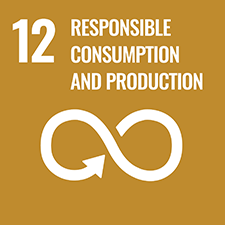
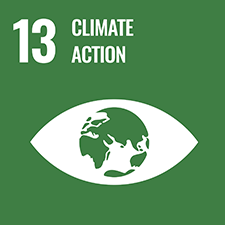
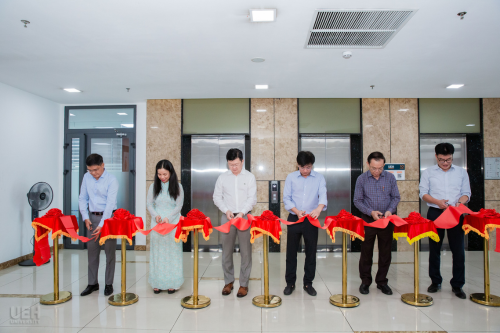

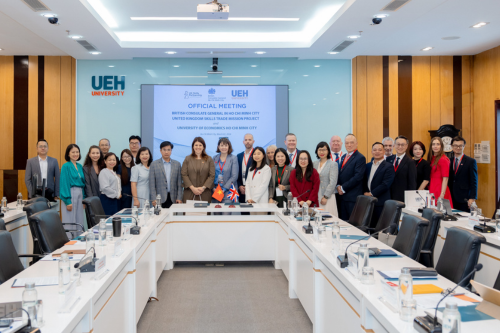

![[Research Contribution] The influence of greenwashing on green purchasing intentions in the electric motorbike sector: the mediating role of green brand trust and green word-of-mouth of GenZ](/images/upload/thumbnail/ueh-thumbnail-639081264718342243.png)
